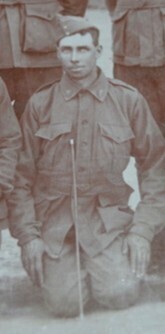FAHEY, Edward
| Service Number: | 364 |
|---|---|
| Enlisted: | Not yet discovered |
| Last Rank: | Private |
| Last Unit: | 7th Infantry Battalion |
| Born: | Not yet discovered |
| Home Town: | Not yet discovered |
| Schooling: | Not yet discovered |
| Occupation: | Not yet discovered |
| Memorials: | Merino War Memorial, Wangaratta and District Victory Roll |
World War 1 Service
| 19 Oct 1914: | Involvement Private, 364, 7th Infantry Battalion, --- :embarkation_roll: roll_number: '9' embarkation_place: Melbourne embarkation_ship: HMAT Hororata embarkation_ship_number: A20 public_note: '' | |
|---|---|---|
| 19 Oct 1914: | Embarked Private, 364, 7th Infantry Battalion, HMAT Hororata, Melbourne |
Help us honour Edward Fahey's service by contributing information, stories, and images so that they can be preserved for future generations.
Add my storyBiography contributed by Aubrey Bairstow
Edward Vernon Fahey enlisted at Wangaratta on 17 August 1914. He was one of the “Wangaratta Boys”. He embarked Melbourne for the Middle East on 21st October 1914 onboard the Transport A20 "Hororata". They disembarked at Alexandria on 2nd December 1914 and were sent to Camp Mena, Egypt where the Battalion undertook further training before being called to undertake defensive duties along the Suez Canal following the failed Turkish First Suez Offensive in February 1915.
Edward was a "First Day Lander" (25th April 1915) at ANZAC Cove and fought in the Battle of the Landing - On the morning of 25 April 1915 the Battalion took part in the Landing at Anzac Cove, coming ashore as part of the second wave. Over the course of the first week the Battalion was involved in establishing the beachhead and suffered heavily, losing five officers and 179 men killed or died of wounds.
On 29 April, the 2nd Brigade was relieved by the 12th (Deal) Battalion and in early May the Battalion was able to reorganise itself after its baptism of fire. The respite did not last long, however, for only ten days after the landing at Anzac Cove, the 2nd Brigade was transferred to Cape Helles in order to take part in an attack on Krithia on 8 May 1915. The attack was a very costly failure, with the battalion losing a further six officers and 87 men killed. Nevertheless, they were involved in what is believed to be the first brigade-level attack conducted by an Australian force against an entrenched enemy and the attack earned the Victorians many plaudits. Edward was promoted to Corporal on 14th May 1915 but reverted to the ranks on his own request the next day.
His medical file shows that a shell burst very close to him at Gallipoli on 21 May 1915 and this resulted in weakness to his back. He was evacuated sick from Gallipoli to the 2nd Australian General Hospital Ghezirah on 19th June 1915 with Pleurisy and later Rheumatism.
He embarked Suez on Escort Duty on the "Karoola" on the 14th of November 1915 and disembarked Melbourne on the 4th December 1915. Edward was posted to duty as Recruiting Sergeant on the 17th January 1916. He resigned and went A.W.O.L on 8th May 1916 with an arrest warrant issued 27th September 1916. He was discharged in absentia and in consequence of desertion 21st July 1920.
Unbeknown to the AIF he had re-enlisted as N94391 Edward Vernon Robinson in 1918 although was found medically unfit. He had been receiving private medical treatment to resolve his issues in order to re-enlist. His doctor being among others Sir Herbert Maitland in Potts Point.
His file clearly states that he was not issued to medals on account of being a deserter. The Medal Board determined he was not entitled to any pension or medallic recognition. A 1914-15 Star was initially prepared for him but was not issued. Subsequent to his death as a widower in 1970 his medals were finally issued to his family – being named in the style used at that time – seemingly some time after 1990.
In the 1959 he resurfaced under the name of Robinson and claimed an artificial leg from the Repatriation Commission. He stated that he had had one made by the Repatriation Artificial Limb Factory in 1943 and files supported that.
He had lost his leg in a tram accident some 16 years prior and was still working as a painter and decorator. He suffered from gastritis and bronchitis attributed to his service at Gallipoli.










